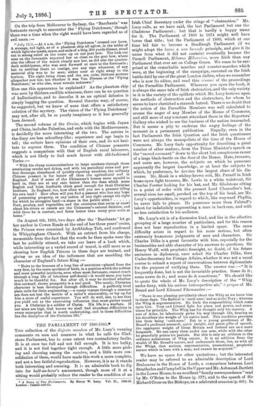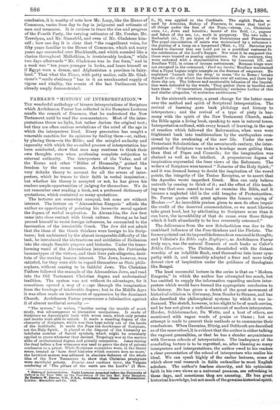THE PARLIAMENT OF 1880-1885.* This collection of the disjecta membra
of Mr. Lucy's running comments on men and manners in what he calls the Glad- stone Parliament, has to some extent two contradictory faults. It is at once too full and not full enough. It is too bulky, and it is not tied together tight enough. A little more pick- ing and choosing among the numnbra, and a little more con- solidation of them, would have made this work a more complete, and not a less faithful reproduction. However, it is as it stands both interesting and amusing. It it an admirable book to dip into for half-an-hour's amusement., though more of it at a sitting would probably reduce the reader to the condition of an
• d Diary of Two Parliaments. By Henry W. Lucy. VOL II., 1880-85. London : Cassell and Co. Irish Chief Secretary under the stings of "obstruction" Mr. Lucy calls, as we have said, the last Parliament but one the Gladstone Parliament ; but that is hardly a happy name for it. The Parliament of 1869 to 1874 might well have
borne that title ; but the Parliament of 1880, which at one time bid fair to become a Bradlaugh Parliament (if we might adopt the /ucus a non lucendo principle, and give it its name from what it did not contain) eventually became the Parnell Parliament, Hiberno Hibernius, more Irish than any Parliament that ever sat on College Green. We cease to be sur- prised at the remarkable marches and counter-marches which were, at the beginning of the campaign, executed on the Irish battle-field by one of the great London dailies, when we remember who is now its editor, and read this resume of the proceedings of the Parnellite Parliament. Wherever you open the book, it is always the same tale of Irish obstruction, and the only variety in it is the variety of the epithets which Mr. Lucy bestows upon the methods of obstruction and the obstructors, for whom he seems to have cherished a staunch hatred. There is no doubt that the action of the Parnellite Members was well calculated to arouse the anger of any Member of the House of Commons, and still more of any constant attendant there in the Reporters' Gallery wbo wished to see the business of the nation transacted. But it seems a pity to enshrine the angry feelings of the moment in a permanent publication. Happily, even in the last Parliament the Irish Question and the Irish questioners were not always the monopolists of the time of the House of Commons. Mr. Lucy finds opportunity for describing a great number of other matters, from the Prime Minister's speech on the "sacred covenant" down to the short but conspicuous career of a large black-beetle on the floor of the House. Hats, trousers, and coats are, however, the subjects on which he possesses apparently the largest knowledge, or at least the subjects to which, by preference, he devotes the largest share of his dis- course. Mr. Monk in a whitey-brown suit, Mr. Parnell in Irish home-spun light trousers, Mr. Lewis in a white waistcoat, Sir Charles Forster looking for his hat, and Mr. Gladstone sitting to a point of order with the present Lord Chancellor's hat, several sizes too small, perched on the top of his head, are Mr. Lucy's opportunities, in regard to which, like wayward Phyllis, he never fails to please. He possesses more than Falstaff's talent for indefinitely augmenting a man in buckram, and with no less satisfaction to his audience.
Mr. Lucy's wit is of a discursive kind, and lies in the effective grouping of a large number of particulars, and for this reason does not bear reproduction in a limited space. The same difficulty arises in regard to his more serious, but often extremely humorous judgments of men and characters. Sir Charles Dilke is a great favourite with him, especially for the businesslike and able character of his answers to questions. Sir Henry Wolff, with prophetic foresight, no doubt, of his future eminence in diplomacy, once asked Sir Charles Dilke, then Under-Secretary for Foreign Affairs, whether it was not a usual course to submit a report of conversations between diplomatists for the purpose of verifying them. The answer was :—" It is
frequently done, but is not the invariable practice. Some do it; some never do it ; and some do it sometimes." We should like to quote the whole of Mr. Lucy's description of the " Whig under forty, with his serious introspective air," a propos of Mr. Brand and Lord Edmond Fitzmaurice :— " There is one pleasing peculiarity about the Whig as we know him in these days. The Radical is cock-sure,' and so is the Tory ; whereas the Whig is argumentative. He feels the responsibility which rests upon him. Tory and Liberal fight for place and power, and some- times for principle. The Whig has for thought only his country. A sort of Atlas, he laboriously picks his way through life, bearing on his shoulders the weight of his native land. This condition prevents him from being cock-sure.' But to a young gentleman of Mr. Brand's profound research, quick insight, and great gifts of speech, the aggregate weight of Great Britain and Ireland are as a mere knapsack. He can carry them under one arm, while with the other he gracefully points his periods. Bat this is only an addition to the ordinary substratum of Whig nature. It is an addition from the wealth of Mr. Brand's nature, and underneath these, lies, as with all the Whigs, that serious, argumentative, unemotional, prophetic nature which is born with a man, and cannot be acquired."
We have no space for other quotations ; but the interested reader may be referred to an admirable description of Lord Brabourne in the House of Lords, a comparison between Lord Stratheden and Campbell in the Upper and Mr. Ashmead-Bartlett in the Lower House, to an excellent " family correspondence " read by Mr. O'Brien to the House (p. 377), and to the speech of Sir Richard Cross on the Bishops, on a celebrated occasion (p.401). In conclusion, it is worthy of note how Mr. Lucy, like the House of Commons, varies from day to day in judgment and estimate of men and measures. It is curious to trace the rise and progress of the Fourth Party, the varying estimates of Mr. Forster, Mr. Trevelyan, and Mr. Stansfeld, and even of Mr. Gladstone him- self ; how one day it is clear that "the magnificent voice, for fifty years familiar to the House of Commons, which not many years ago resounded over Blackheath, and which. sounded like a clarion throughout Midlothian, is irretrievably broken," while two days afterwards "Mr. Gladstone was in. fine form," and in a week was " ten years younger in looks, and bears himself as if Egypt were a dream, and Afghanistan a province in fairy- land." That what the Times, with petty malice, calls Mr. Glad. stone's "senile obstinacy " has in it an unexhausted supply of vigour and vitality, the events of the last Parliament have already amply demonstrated.



































 Previous page
Previous page